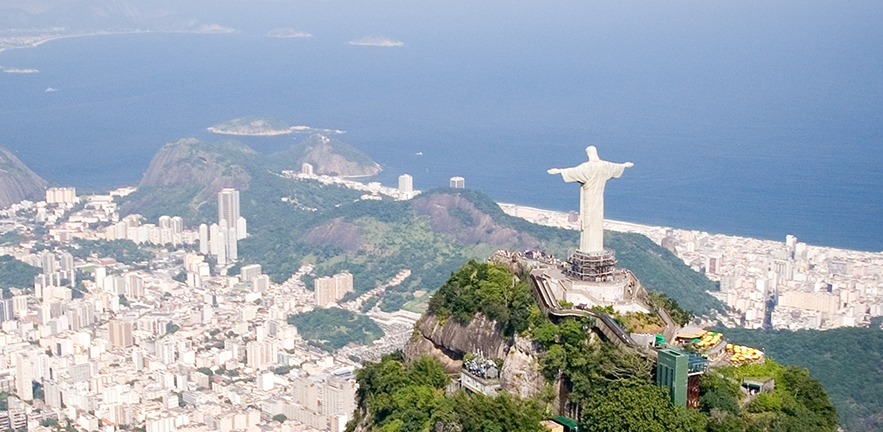Taxes and bureaucracy pose problems, but the investor climate has improved.
This month’s Cambridge Judge Business Debate podcast was recorded in Brazil, as part of the international business trip of the Executive MBA (EMBA) class of 2018 of Cambridge Judge Business School.
Faculty members Michael Kitson, University Senior Lecturer in International Macroeconomics, and Dr Jochem Kroezen, University Lecturer in International Business, led the discussion featuring two special guests from Brazil’s business community: Guiherme Freire, a serial entrepreneur who is cofounder and Chief Financial Officer of micro-mobility company Grin Scooters, and Daniel Bicudo, Loyalty Programme Director at Azul Airline, the third largest air carrier in Brazil.
This is the 12th in a series of “Cambridge Judge Business Debate” podcasts featuring faculty and others associated with Cambridge Judge Business School and the broader Cambridge community.
This podcast focuses on business in Brazil – the opportunities, the challenges, and what to expect from new President Jair Bolsonaro, who was elected last October and took office on 1 January.
Here are some edited excerpts from the podcast discussion:
The Brazilian economy
Michael Kitson: “What is the state of the Brazilian economy at the moment?”
Guiherme Freire: “Being an entrepreneur in Brazil is never easy, but it’s a very good moment. Brazil is receiving a lot of investment, including SoftBank investing $5 billion in the region and mostly in Brazil.
Jochem Kroezen: “What was lacking before, and now getting better and stronger?”
Guiherme Freire: Five years ago it was very hard to raise capital in Brazil – there were just two or three funds with very few outside investors, and now there is competition: if you have a good track record people will compete for you, and this was unimaginable a few years ago. It’s changing for the better.”
Jochem Kroezen: “What are the opportunities and challenges for homegrown companies in Brazil to expand and cross borders?”
Daniel Bicudo: “There are opportunities to invest in different countries – when we establish routes to fly we negotiate with the country and establish a base. For Brazil it’s very easy except for Argentina – we’re fighting with Argentina every single day – it’s soccer!”
Guiherme Freire: “They have a hard time realising that we are better at soccer.”
A huge country with regional differences
Michael Kitson: “Is there a Brazil business ecosystem or a Sao Paulo ecosystem?”
Guiherme Freire: “In Brazil it’s Sao Paulo, it’s the place to do business. I’m from Rio, which is a different culture. If you guys go to Rio for fun, it’s amazing, if you do business with people from Rio it’s harder.”
Daniel Bicudo: “Brazil is an enormous country, and the different regions are completely different. For an airline company it’s difficult to negotiate with the 26 states of Brazil.”
Taxes and bureaucracy
Michael Kitson: “What are the challenges in doing business in Brazil?”
Guiherme Freire: “From an entrepreneurial perspective the taxes are insane – you have to do a 10-year MBA to understand what’s going on in terms of taxes. Also, the bureaucracy: things that in the US you do online take at least 45 days in Brazil. There’s a huge difference in how the public sector treats you: we are the ones who move the economy, so the government should be very supportive of what we do, but it’s the opposite.”
Across Latin America
Michael Kitson: Can you tell us of the differences in operating in the different countries in Latin America?”
Guiherme Freire: “The biggest mistake that people from outside the region make is to put LatAm in a box, to say everything is the same – but Brazil is a separate country not only in terms of language but in terms of culture and the way you do business. And if you compare Peru and Chile, they are opposites: in Chile we’re having a hard time because the regulation is so strict about the way you do things, while in Peru you can do whatever you want. It’s very different. Every country is a continent by itself.”
Changes under President Bolsonaro
Michael Kitson: “What policy changes do you think President Bolsonaro will introduce that will be good for your business and for Brazil?”
Daniel Bicudo: “Social security is the biggest problem we have here – we have a huge deficit. I think that in the middle of this year it will be done, something mid-term, and in the next five years we’ll need to have another refurbishment of the social security system.”


